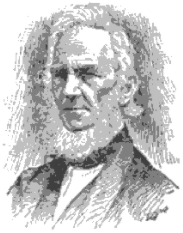John Milton Earle facts for kids
Quick facts for kids
John Milton Earle
|
|
|---|---|
 |
|
| Member of the Massachusetts Senate | |
| In office 1858 |
|
| Member of the Massachusetts House of Representatives | |
| In office 1844–1846 |
|
| In office 1850–1852 |
|
| Personal details | |
| Born | April 13, 1794 Leicester, Massachusetts |
| Died | February 8, 1874 (aged 79) Worcester, Massachusetts |
| Resting place | Worcester Rural Cemetery |
| Political party | |
| Spouse |
Sarah Hussey
(m. 1821) |
| Parents |
|
| Occupation | Businessman, politician |
John Milton Earle (born April 13, 1794 – died February 8, 1874) was an important American. He was a businessman, a politician, and someone who worked to end slavery. He also started the Massachusetts Horticultural Society in 1829, which is a group focused on gardening and plants.
Contents
Early Life and Education
John Milton Earle was born in Leicester, Massachusetts. His parents were Patience Earle and Pliny Earle. The Earle family was well-known in the area.
John went to local schools and also attended Leicester Academy. This helped him get a good education for his time.
Newspaper Editor and Publisher
From 1823 to 1857, John Milton Earle was the editor and publisher of a newspaper. It was called the Massachusetts Spy. After July 22, 1845, the newspaper changed its name to the Daily Spy.
The newspaper offices were located in the Butman Block on Main Street. John enjoyed clever and harmless jokes.
Fighting Against Slavery
John Milton Earle was a strong supporter of the Anti-Slavery movement. This movement worked to end slavery in the United States. He was one of the first people to speak out against it.
He was part of the Whig Party at first. Later, he joined the Free Soil Party. Both parties opposed the spread of slavery. John wanted to make Worcester County a place where people strongly opposed slavery through politics.
Political Career
John Milton Earle served in the Massachusetts state legislature, called the Massachusetts General Court. He was a member for several years.
Serving in the House of Representatives
He served in the Massachusetts House of Representatives during two periods:
- From 1844 to 1846
- From 1850 to 1852
Serving in the Senate
Later, he also served in the Massachusetts Senate in 1858.
Other Public Roles
Besides his work in the state legislature, John held other important jobs. He was a city alderman, which is like a city council member. He also worked as a postmaster, managing the local post office. He was a state commissioner on Indian affairs, helping with matters related to Native American communities.
Horticultural Societies
John Milton Earle had a great interest in gardening and plants. He founded the Massachusetts Horticultural Society in 1829. This society helps people learn about and enjoy gardening.
He also served as the president of the Worcester County Horticultural Society. He held this position from 1848 to 1851.
Family and Anti-Slavery Work
John Milton Earle married Sarah Hussey on June 6, 1821. Sarah was born on August 26, 1799, and passed away on March 9, 1858. She was also a very active abolitionist.
Sarah organized the Worcester Anti-Slavery Sewing Circle. She also helped start the Worcester County Anti-Slavery Society, South Division. Her cousin was Lucretia Mott, another famous leader in the anti-slavery and women's rights movements.
The family lived in Worcester at 262 Main Street. Sarah worked on the Executive Committee of the Worcester County Anti-Slavery Society from 1841 to 1859. She helped organize Anti-Slavery fairs starting in 1848. She even helped open the first National Woman's Rights Convention in 1850.
After she passed away, her obituary in the Worcester Spy newspaper said that "no one has cause to mourn more deeply than the slave, for whose interests her labors were untiring." This shows how much she worked to help end slavery.
Later Life and Legacy
John Milton Earle passed away in Worcester on February 8, 1874. He was buried in the Rural Cemetery in Worcester. He is remembered for his work as a businessman, politician, and especially for his efforts to end slavery and promote horticulture.
 | Georgia Louise Harris Brown |
 | Julian Abele |
 | Norma Merrick Sklarek |
 | William Sidney Pittman |

